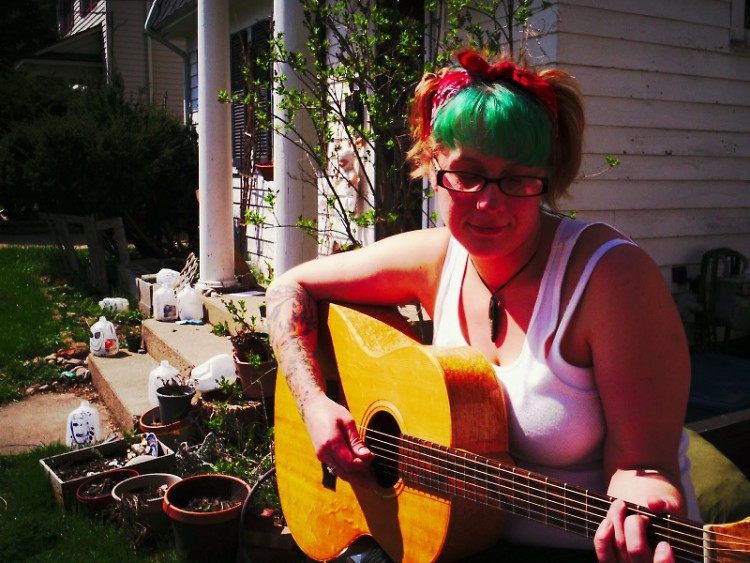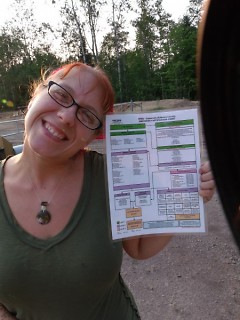No frogs, no birds left to sing
No mold to break down and lay down the foundation for everything
Progress has silenced forever, the joyful trickle and splash of spring
Rachel Carson told the story of just this thing
Sarah Barker, who performs as Sairuhnade, wrote the song "Silent Spring" in honor of Rachel Carson's book by the same title, the book often referred to as marking the start of the modern environmental movement, and one that Barker read in an EcoLit and Activism class at GRCC.
The song chronicles a trip she and a couple of college companions made up north during "that crazy warm March last spring," she recalls.
"We were trying to find the very first frack well site in Michigan, the Pioneer well," says Barker. Due to unusually warm temps into the lower 80s, the snow that was still on the ground in an area between Missaukee and Kalkaska counties was melting rapidly.
"There were pools and pools of water and washed out dirt roads, so we walked along through these wet, wet woodlands," she says.
They never did find the State-Pioneer well site, named with the "state" suffix because it is on state-owned land. But the next day, in a similar patch of woods a few miles north in Kalkaska county, they found more muddy roads and melt-soaked ground, until they got close to the second well site they were looking for.
"We were in the same woodland area, but everything was quiet. The day before, there were all sorts of noises and activity. The frogs and birds were going crazy." But as they neared the formerly fracked and abandoned well head, Barker and her companions found the forest to be eerily quiet, as if it were devoid of all life, except for flies, she says.
That March 2012 trip was the start of a series of trips and songs that Barker is now recording as her first album, with help from some local musician friends.
“Music is important to me because it's the only visceral connection I have to my emotional self," says Barker. "I can take my rational mind and give it some rest and directly communicate with my heart.”
Through the summer of 2012, Barker continued to take weekend road and off-road trips to visit several frack well sites in the northern lower peninsula.
"I met a lot of really cool people trying to educate the public about what was going on," says Barker, "and I saw a whole lot of grief." She recalls the initial disbelief when seeing, with her own eyes, four to 10 acre well pad sites in the Pere Marquette and Mackinaw and AuSable State Forests where the trees were cleared and the ground was leveled to make room for drill rigs and "piles and piles of huge segments of pipe, and all the compressors and diesel motors that keep everything running," says Barker.
Prior to becoming acquainted with fracking in Michigan, she had attended workshops in Ohio.
"The Ohio Fraction camps. Those people really had it down," she says, referring to activist training workshops and the Ohio group's protests and direct actions. They inspired her, and so did the earthquakes.
"Around Youngstown," she explains, "there were nine deep injection wells where they inject fracking's wastewater back into deep geological layers, and those wells triggered a year of earthquakes in an area that doesn't have earthquakes."
Her admiration for the people protesting and dismay about what has happened in Ohio shows up in another of her songs, "All Used Up:"
Cause the water they pump from your land, never comes back
injected under some church in Ohio, where they make the ground crack
Your water filters turn black
Barker's recent performances include a "Women for Water" event at Wealthy Theatre in February and a March 16 day of workshops and music in Lansing, which she co-planned with Clean Water Action's Kate Holloway, called "Save our State." Both events were fundraisers for Michigan Land Air Water Defense, a west Michigan group fighting to stop oil, gas, and water extraction from publicly owned state land.
Barker is intrinsically attached to music.
“You can speak absolutely no words and share a few songs only and completely understand each other enough to respect the other as a living being. It also transcends language barriers... singing and dancing together is something humans have done since.... since we know of. There's something very powerful in that,” says Barker. She is self-taught and started playing the guitar at the age of 19. She chose the guitar because she’s been a singer for her entire life, and so “it seemed natural that I should at least learn guitar,” she says.
"I guess if I had to pick a focus, it would be water," says Barker. She explains that fracking is a very demanding process when it comes to water usage. The typical horizontal hydraulically fractured well requires, according to the MDEQ, an average of 5-7 million gallons of water to frack one of its long lateral runs.
"But each well can have several horizontals," Barker says. One of the well sites she visited, the State-Excelsior well site in Kalkaska county, reported using 21 million gallons of water.
“When we are dealing with record droughts and such immense scarcity of what we need for basic human survival, the absurdity of using perfectly clean ground water in such a wasteful and harmful manner becomes clear,” she says.
"This is water that is never returned to the hydrologic cycle. They can't return it," she says, referring to the MDEQ's regulation of deep injection wells, which are used to dispose of fracking's toxic flowback or wastewater. Barker hopes to complete coursework at GRCC next year and pursue a degree in geology or geophysics.
One of Barker’s primary reasons for opposing fracking is because it seems completely unnecessary.
“Fracking should be outright banned because it's an unnecessary process. Just because there is methane down there doesn't mean we need to go to such extravagant lengths to get at it," she says. "We don’t need it!” Her reasoning is that methane gas is of high abundance. A lot of it, she says, is shipped overseas.
When asked what can be done to help stop fracking from becoming a common activity in Michigan, Barker laughs.
“I’d love to run the media for a day,” she says. The best way to fight against fracking, according to Barker, is to increase the exposure of this controversial issue within the general public. Her preferred method of doing so is direct action. Direct action may entail a lot of things, but the important part is getting involved and spreading the message to as many people as possible.
“We all have to pitch in," says Barker. "This is a serious issue. We will die without water.”
She also criticizes mainstream news sources for being incredibly lenient towards the topic of fracking. She cites the lack of coverage there is on fracking and how “bad bad bad” the coverage is.
Her "first job" as a mother is critical, she says. Her son is the most important thing in her life, which is why she focuses on using music to spread her message.
"It's a safe and effective way to get the word out about fracking," she explains.
“It’s a boom and bust industry,” says Barker about fracking's sustainability. Similar to the gold rushes of yonder years, fracking sites are short lived. "They become ghost towns as soon as they finish scavenging the earth, leaving nothing behind."
Barker’s plan to further the cause in the immediate future is through community outreach. She intends to perform music for churches, benefits and any venue with people in the seats or on the grass to listen. Because, as her song "All Used Up" notes, the gas and oil industry, when it comes to leasing public land and extracting what they call "resources" in the ground: “They won’t stop till it’s all used up, that’s a wolf in sheep’s clothing, gotta call their bluff.”
The Rapidian, a program of the 501(c)3 nonprofit Community Media Center, relies on the community’s support to help cover the cost of training reporters and publishing content.
We need your help.
If each of our readers and content creators who values this community platform help support its creation and maintenance, The Rapidian can continue to educate and facilitate a conversation around issues for years to come.
Please support The Rapidian and make a contribution today.


